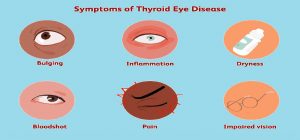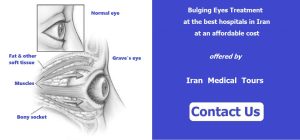Bulging Eyes or Exophthalmos Treatment in Iran
Exophthalmos, also known as bulging eyes, is a condition in which one or both eyes protrude forward from their sockets, making them appear unusually large, strained, or wide open. The condition is most commonly associated with thyroid-related issues, such as Graves’ disease or hyperthyroidism (overactive thyroid). In rarer cases, it may develop from hypothyroidism (underactivity of the thyroid gland) or Hashimoto’s thyroiditis. Iran is a leading destination for advanced exophthalmos treatment, offering comprehensive care. Bulging eyes or exophthalmos treatment in Iran includes thyroid medications, corticosteroids, artificial tears, immunosuppressants, and surgery for advanced cases. A prompt and accurate diagnosis is crucial to alleviating symptoms and improving the patient’s quality of life.
Restore Eye Health with Expert Care at Affordable Prices by Iran Medical Tours
Main Causes of Eye Bulging (Exophthalmos)
Understanding the underlying cause helps determine the most effective treatment.
1. Thyroid Eye Disease (TED):Commonly associated with Graves’ disease, TED is an autoimmune condition that causes inflammation and swelling of the tissues behind the eyes, leading to proptosis. It is the primary cause of exophthalmos among adults.
2. Orbital Cellulitis:A serious bacterial infection that inflames the tissues around the eye, often causing pain, swelling, pus buildup, and protrusion. It is a major cause of both unilateral and bilateral eye bulging in children.
3. Orbital Tumors:Benign or malignant tumors within the eye orbit can press against the eyeball, pushing it outward.
4. Trauma and Injury:Severe facial or orbital trauma can alter the alignment or structure of the eye socket, resulting in eye protrusion.
5. Cavernous Sinus Thrombosis:A blood clot in the cavernous sinus (a vein located at the base of the brain) can obstruct proper blood drainage from the eyes, leading to swelling and proptosis.
6. Vascular Malformations:Abnormal blood vessel formations, such as arteriovenous malformations, may disturb blood circulation in the orbit and contribute to bulging eyes.
Each condition demands a tailored diagnostic and therapeutic approach for the best outcomes.
Options for Exophthalmos (Bulging Eyes) Treatment in Iran
Treatment for bulging eyes depends on the underlying cause and severity of the condition:
-
Graves’ Disease/TED:Treatment may involve regulating thyroid hormone levels with medication, using corticosteroids to control inflammation, and, in severe cases, performing orbital decompression surgery.
-
Orbital Cellulitis:Requires immediate hospitalization and intravenous antibiotics to stop the infection from spreading.
-
Orbital Tumors:Depending on the tumor type, treatment may involve surgery, radiation therapy, or chemotherapy.
-
Cavernous Sinus Thrombosis:Requires urgent intervention with anticoagulants and antibiotics to dissolve the clot and control infection.
-
Glaucoma (if present):Controlled with medications, eye drops, or surgical procedures to reduce intraocular pressure.
Seek prompt medical attention if you experience new or worsening eye bulging, especially with pain, vision changes, or redness. Early diagnosis and treatment are keys to protecting your vision.
💬 Contact us for consultation.
Surgical Options for Severe Exophthalmos (Bulging Eyes) Treatment in Iran
If non-surgical treatments are ineffective, surgical options for exophthalmos or bulging eyes treatment in Iran may be required to correct the condition and restore comfort:
Eyelid Surgery: Helps protect the cornea and prevents exposure-related damage.
Orbital decompression Surgery: Performed under general anesthesia, this procedure enlarges the orbital cavity by removing small bone sections and excess fat, creating more room for the eye and its surrounding tissues to move back into a natural position.
Eye muscle surgery: Realigns eye movement and corrects muscle imbalance caused by exophthalmos.
Why Exophthalmos (Bulging Eyes) Treatment in Iran?
Iran has become a top destination for ophthalmic care and reconstructive eye surgery, particularly for complex eye conditions such as exophthalmos. Cities like Tehran, Shiraz, and Mashhad host specialized eye hospitals equipped with advanced technology and expert surgeons, many of whom have trained internationally. Outcomes in Iran often rival those of top-tier centers worldwide, while treatment costs remain much more affordable.
Key Advantages of exophthalmos (bulging eyes) treatment in Iran:
🌟 Warm hospitality: Medical centers in Iran are known for their patient-centered approach and friendly, multilingual staff.
⚙️ Cutting-edge facilities: The specialized eye centers in Iran are equipped with modern diagnostic tools and surgical technologies that meet or exceed international standards.
🏥 Accredited Hospitals: Many Iranian hospitals hold national and international accreditations, ensuring strict adherence to quality and safety standards.
💰 Affordable medical packages: One of the major benefits of traveling to Iran for treatment is the affordable prices. International patients can save 40–60% on medical expenses while receiving top-tier care.
👨⚕️ Expert Surgeons: Ophthalmologists in Iran are highly trained in managing complex cases, often with fellowships from Western countries.
🧳 Comprehensive Medical Tourism Services: From visa assistance to airport transfers and hotel booking, everything is arranged for a stress-free treatment journey in Iran.
🕌 Rich Tourism Experience: Iran offers diverse cultural and natural tourist attractions, allowing patients to combine their treatment in Iran with sightseeing and relaxation. Iran also offers a variety of options for accommodation, ranging from budget-friendly apartment hotels to luxury hotels.
Iran Medical Tours is a medical tourism facilitator in Iran that collaborates with elite hospitals and ophthalmologists to deliver personalized treatment packages at cost-effective prices. The team provides comprehensive support services, including Iran visa facilitation, local transfers, accommodation, interpreters, and guided city tours, allowing patients to focus on recovery.
How to Recognize Bulging Eyes Symptoms
Detecting eye protrusion early is key to preventing complications. You may have exophthalmos if you notice:
-
The white part of the eye is more visible above or below the iris.
-
Eyes look larger or more “open” than usual.
-
Difficulty closing the eyelids or experiencing double vision.
-
Noticeable protrusion of one or both eyes.
-
A sensation of pressure or pain behind the eyes.
Diagnosis Steps
Diagnosis of the cause of bulging eyes requires a comprehensive approach:
Medical and Family History Review: To assess symptoms, thyroid conditions, and family background
Comprehensive Eye Examination: To check vision, eye movement, and overall eye health
Blood Tests: To detect thyroid dysfunction (for Graves’ disease) or autoimmune activity
Imaging Tests:
-
CT scan or MRI: To visualize the orbit and detect infections, tumors, or other abnormalities
-
Comprehensive Eye Examination: Conducted by an ophthalmologist to confirm diagnosis and severity



